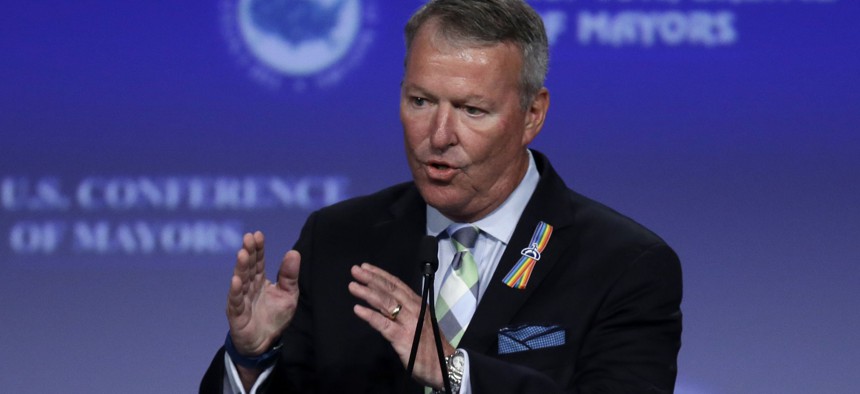Orlando Mayor: Cities Need to Be Better Prepared for Mass Violence

Orlando Mayor Buddy Dyer addresses the the U.S. Conference of Mayors in Indianapolis, Sunday, June 26, 2016. Michael Conroy / AP Photo

Connecting state and local government leaders
“It’s important that we as mayors begin a larger discourse about how we prepare for and respond to these types of events,” Mayor Buddy Dyer tells the U.S. Conference of Mayors.
With his own city blindsided a little more than two weeks ago by a horrific shooting incident that left 49 victims dead and dozens wounded, Orlando Mayor Buddy Dyer implored mayors from around the nation over the weekend to step up preparedness efforts for responding to acts of mass violence.
“I’m not talking about a hurricane or tornado, I’m talking about an intentional act of violence that takes the lives of our residents and wreaks havoc on our cities.” Dyer told fellow mayors Sunday in Indianapolis, during remarks at an annual meeting of the U.S. Conference of Mayors.
He added: “It’s important that we as mayors begin a larger discourse about how we prepare for and respond to these types of events.”
Dyer, first elected mayor in 2003, said he wanted to avoid getting tangled in thorny political debates about issues like gun control.
Instead, the mayor said he wants to focus on carrying out a comprehensive, formal examination of best practices for handling incidents like the mass shooting that took place in the early morning hours of June 12 at Pulse, a gay nightclub in Orlando.
During his comments, Dyer also offered details about the response to the attack.
It was around 3 a.m. on the morning of June 12, when the mayor said he woke up to “the phone call that every one of you dread getting.”
One of the first things Dyer said he did after learning about the situation at Pulse was call his 26-year-old son to make sure he was safe—he was.
Dyer then made his way to a mobile command center, where law enforcement officials had convened. His goals, at that point, included: not getting in the way of first responders, avoiding actions that might undermine the command of the city’s police chief, and gathering as much information as possible.
The mayor recounted how the gunman, Omar Mateen, had retreated to a bathroom, where there were hostages, and made threats over the phone to authorities about how he would put explosive vests on four people inside the club, and position them in corners of the building.
While in the building, Mateen also called 911 and pledged allegiance to the so-called Islamic State, a terrorist group.
Prompted by the threat of explosives, Orlando Police Chief John Mina decided to have police mount an offensive. To do so, they broke a hole in a wall of the club, an operation that ended up requiring the building to be rammed with a Bearcat armored vehicle.
Dyer noted that he had previously caught flack over the city’s purchase of the armored vehicle.
“If we had not had that Bearcat that night, we would not have gotten in that building when we did,” he said. “And I’m quite certain there would have been additional victims.”
With the wall breached, hostages escaped outside, followed by the shooter, who was shot dead by authorities. No explosives were found.
In the immediate aftermath of the incident, Dyer felt his most important job was to communicate with the public.
At an initial press conference, he said his aim was to convey concise facts, and to let people know the situation was under control and that the gunman had acted alone.
But toward the end of that media briefing, Mina, the police chief, when asked by a reporter about the fatality count, confirmed that only 20 people had died.
“We knew that there were more than 20 dead at that point,” the mayor said.
Dyer told the chief that at the next press conference the actual number of people killed would need to be shared with the public. It became the mayor’s responsibility to do so.
“That was the hardest moment I had during the whole process,” Dyer said of revealing the true death toll at the second press conference. “You could hear a collective gasp from the reporters.”
The mayor lauded the performance of city staff, and others, during and after the shooting incident. “The way that Orlando responded to this tragedy probably hasn’t been perfect,” he said. “But I’m extraordinarily proud of the way that we did respond.”
Investing in technology and training, and hiring solid employees were crucial steps in positioning the city to react in that way, he said.
As were relationships Dyer said he had previously forged at gatherings like Ramadan dinners, police conventions, gay pride events and neighborhood meetings.
“It’s still so hard for us to comprehend how, and why, this could possibly happen in Orlando,” the mayor said.
He added: “Each one of our cities needs to be better prepared to respond to this type of incident.”
PREVIOUSLY on Route Fifty :
Bill Lucia is a Reporter for Government Executive’s Route Fifty and is based in Washington, D.C.

NEXT STORY: W.Va. Flood Death Toll Revised; WMATA General Manager Announces Major Job Cuts





